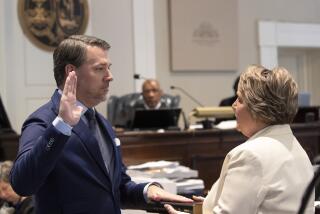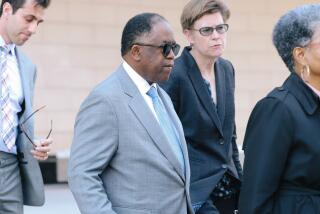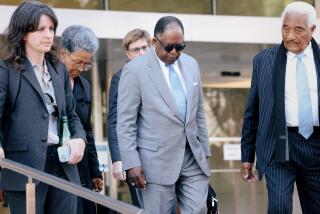Hearing Ordered on Hedgecock’s Tampering Claim
- Share via
Setting the stage for what one judge described as “a trial after a trial,” the 4th District Court of Appeal on Monday ordered a lower court to hold a hearing on former San Diego Mayor Roger Hedgecock’s claim that his felony conviction should be overturned because of jury-tampering allegations.
However, the appellate court added that, if a Superior Court judge eventually denies Hedgecock’s request for a new trial, the October, 1985, conspiracy and perjury conviction that forced his resignation from office should stand.
The hearing on the jury-tampering charges is not expected to occur until at least this fall, if at all, and attorneys on both sides said a final resolution of the 4-year-old case might not come until next year.
Good, Bad for Both Sides
In a complicated 2-1 ruling, the San Diego-based appellate court released a 139-page decision that, in the words of Hedgecock attorney Charles Sevilla, “gave both sides something to be pleased with and something to grumble about.”
“From our perspective, the bottom line is that we’ll get the new-trial hearing that we were denied the first time around,” Sevilla said. “On that point, we did very well. But on others we didn’t do so well.”
Indeed, prosecutors took heart from the fact that the three-justice appeals panel rejected a wide array of legal arguments--ranging from insufficient evidence to claims of legal errors by a judge and prosecutors--offered by Hedgecock’s attorneys as reasons why he deserves a new trial.
Convinced of Guilt
Moreover, despite their concerns over the jury-tampering charges, the justices emphatically stated that they believe Hedgecock is guilty as charged of conspiring with several prominent political backers to funnel tens of thousands of dollars in illegal contributions to his 1983 mayoral campaign.
“In our view, the evidence fully supports the jury’s conclusion that Hedgecock was part of a conspiracy to violate the disclosure requirements of the Political Reform Act and the local campaign finance laws,” the justices wrote.
Said Deputy Atty. Gen. Robert Foster, who argued the prosecutors’ case in a hearing before the appeals court last December: “That makes it pretty clear where they stand. It supports what we’ve said all along. We’re happy with that.”
However, prosecutors were clearly unhappy with the appellate justices’ order for a Superior Court hearing on the jury-tampering allegations--a hearing that both sides agreed probably represents Hedgecock’s best chance of over turning his conviction and the one-year local jail sentence facing him.
Hedgecock, now a radio talk-show host, is free pending the outcome of his appeal. Hedgecock is vacationing in Brazil and could not be reached for comment Monday.
Declaring that he believes that the 4th District justices erred in that part of their ruling, Foster said Monday that he intends to ask the California Supreme Court to rescind the order for a hearing on the jury-tampering charges. Noting that other courts have ruled differently under similar circumstances, he argued that the justices “are changing the law by ordering this hearing.”
Dissenting Opinion
Concurring with Foster, recently retired Justice Edward T. Butler, whose official departure from the 4th District court was delayed to enable him to finish work on the Hedgecock case, wrote a dissenting opinion in which he disputed the need--and legal propriety--of a new hearing on the jury-tampering charges.
Differing with Justices Donald Work and Howard Weiner on that key point, Butler called the ordered hearing “a miscarriage of justice” that “adds yet another level to the leaning tower of our jurisprudence--a trial after a trial.”
“My sense of justice says enough is enough,” Butler wrote in his 16-page dissent. “I would affirm the convictions in their entirety.”
Defense Also Will Appeal
Although obviously supportive of the new-trial hearing, defense attorney Sevilla explained that he, too, plans to appeal Monday’s ruling to the state Supreme Court. In his appeal, Sevilla will ask the justices to overturn those parts of the appellate court decision rejecting the two dozen legal arguments that he contended entitle Hedgecock to a new trial.
The appeals must be filed with the Supreme Court within 40 days, after which the court could either order a hearing or simply issue a ruling. If the high court decides to hear the case, Sevilla predicted, the already-protracted proceeding--which Hedgecock once referred to as San Diego’s “long-running political soap opera”--will not be resolved until 1989. However, if the court upholds Monday’s ruling, the Superior Court hearing on the jury-tampering charges could be held this fall, the lawyers said.
Those allegations surfaced shortly after Hedgecock was convicted 2 1/2 years ago of conspiring with former J. David & Co. principals J. David (Jerry) Dominelli and Nancy Hoover to funnel illegal donations to his 1983 race through a political consulting firm owned by his close friend Tom Shepard.
Financial Statements
The perjury counts on which Hedgecock was convicted charged that he purposely falsified financial disclosure statements to conceal the improper personal and political financial aid that he received from Hoover and Dominelli.
In sworn affidavits, two jurors alleged that court bailiff Al Burroughs Jr. improperly discussed the case and the progress of their deliberations with jurors while they were sequestered during deliberations.
According to the two jurors, Burroughs allegedly helped jurors define the crucial legal term reasonable doubt, pressured the jury to reach a verdict expeditiously by reminding them of the cost of the hotel where they were staying, and provided jurors, including one minor, with liquor. The 10 other jurors denied that the bailiff had behaved improperly.
Judge’s Handling Questioned
In denying Hedgecock a new trial in December, 1985, then-Superior Court Judge William L. Todd Jr. rejected the defense’s contention that Burroughs’ alleged misconduct tainted the jury’s verdict. Todd has since been elevated to the 4th District court, but did not sit on the three-judge panel that reviewed Hedgecock’s case.
The appellate justices questioned Todd’s handling of the legal investigation into the jury-tampering allegations. Todd refused to permit testimony by the jurors or the bailiffs, deciding the issue solely on the basis of sworn statements filed by all parties.
“The lack of an evidentiary hearing, as well as several other procedural errors in the resolution of the new-trial motion, denied Hedgecock a fair and complete opportunity to have his serious allegations of misconduct properly considered,” the ruling said.
Affidavits Faulted
Saying that the sworn affidavits provide a “less than enlightening . . . picture” of the disputed facts and interpretations contained within the jury-tampering allegations, the justices added that “live testimony by jurors in open court may sometimes be necessary to accurately establish the underlying facts.”
“There are situations in which the defendant’s right to a fair trial may require a comprehensive inquiry into the facts underlying the claim of jury tampering or jury misconduct,” the decision said.
“The circumstances of this case present such a situation. (Todd) was besieged with a welter of conflicting declarations, most of which raised more questions than they answered. How was (Todd) to judge the credibility of witnesses whose demeanor he had no opportunity to observe and who were never subjected to cross-examination?”
Bailiff Rebuked
The justices also strongly rebuked Burroughs for his behavior during the jury’s sequestration, saying, “It is reasonably clear that at times bailiff Burroughs conducted himself improperly.”
In particular, the justices faulted Burroughs for providing the jurors with “significant amounts of alcoholic beverages” that were consumed after deliberations--leading to allegations that at least one juror was seriously hung over during jury votes.
An “even more troubling” transgression, the justices wrote, were Burroughs’ comments to the jury’s foreman about the county’s cost of sequestering the jury. “By the mere fact of mentioning expense, Burroughs was implying it was a relevant consideration for the jury”--which it was not, the justices said.
May Not Be Enough
However, the justices pointedly emphasized that the jury-tampering allegations alone may not entitle Hedgecock, whose first trial ended in a hung jury, to a new, third trial. Instead, they simply said that the allegations need to be investigated further to determine whether Burroughs’ conduct and the jurors’ drinking tainted Hedgecock’s verdict.
On that point, Butler disagreed with his colleagues, saying the allegations had already been sufficiently examined and that another hearing would simply add another legal layer to the case.
“It is one thing to try the issue of guilt to a jury and quite another to put that jury on trial with respect to its verdict,” Butler wrote. “. . . The trial after a trial now overshadows the trial itself.”
Memory an Issue
If a Superior Court hearing is ultimately held--a contingency that hinges on the Supreme Court’s action--even the appeals court justices conceded that it could be difficult for jurors and the bailiffs to fully recall facts and nuances surrounding the tampering allegations so long after the case ended.
Prosecutor Foster, however, said he doubts that hazy memories would be an insurmountable obstacle to holding such a hearing.
“That’s a red herring, because if you look at civil cases, they usually don’t go to trial for two years or more,” he said. “This was an important case, so I’m sure people remember these details. We also have the statements from the time to refresh their memories.”
And, although he opposes the hearing primarily on legal grounds, Foster added that there is another reason he views another judicial review of the jury-tampering allegations with considerable disdain.
“Whichever way it goes, there will be another appeal,” he said. “Just what we need.”
More to Read
Sign up for Essential California
The most important California stories and recommendations in your inbox every morning.
You may occasionally receive promotional content from the Los Angeles Times.













